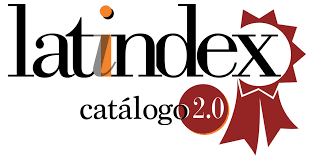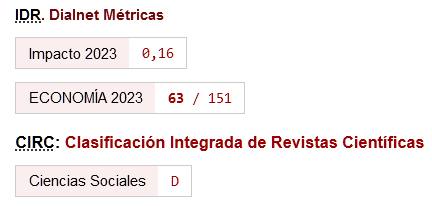Después de "Río+20”: bienes ambientales y relaciones de poder
Descargas
Citas
Adriaanse, A., Bringezu, S., Hammond, A., Moriguchi, Y., Rodenburg, E., Rogich, D., & Schütz, H. (1997). Resource Flows: The Material Basis of Industrial Economies. Washington DC: World Resources Institute.
Arrow, K., Dasgupta, P., Goulder, L., Mumford, K., & Oleson, K. (2010). Sustainability and the measurement of wealth. (Documento de trabajo 16599). Cambridge: National Bureau of Economic Research. https://doi.org/10.3386/w16599
Ayres, R. U. (1989). Industrial Metabolism. En R.U. Ayres, Norberg-Bohm V., Prince J., Stigliani W.M., & Yanowitz J. (Eds.), Industrial Metabolism, the Environment and Application of Materials-Balance Principles for selected Chemicals. (Reporte IIASA RR-89-11).
Bartelmus, P. (2006). SEEA-2003: Accounting for sustainable development? Ecological Economics, 61 (4), 613-616. https://doi.org/10.1016/j.ecolecon.2006.09.008
Boulding, K. (1967). The economics of the Coming Spaceship Earth. En J.Henry (Ed.), Environmental Quality in a Growing Economy. Baltimore: Johns Hopkins Press, 3-14.
Boulding, K. (1972). The Future of Personal Responsibility. The American Behavioral Scientist (Beverly Hills), 15 (3), 329-359. https://doi.org/10.1177/000276427201500303
Brundtland, G.H. (1987). Our common Future. Oxford: Oxford University Press.
Correa, R. (2009). Ecuador: de Banana Republica a la No República. Bogotá: Debate.
Correa, R., Espinoza, M. F., Patiño, R., Aguiñaga, M., & Falconí, F. (2012). Ecuador hacia la conferencia de Naciones Unidas sobre desarrollo Rio + 20. Quito: Ministerio Coordinador de Patrimonio.
Daly, H.E. (1991). Steady-State Economics. (2da. Ed. Con nuevos ensayos). Washington DC: Island Press.
Daly, H. E. (2007). Ecological economics and sustainable development: selected essays of Herman Daly. Edward Elgar Publishing. https://doi.org/10.4337/9781847206947
Daly, H.E., & Cobb, J. (1989). For the Common Good. Boston: Beacon Press.
Easterlin, R. A. (1974). Does Economic Growth Improve the Human Lot?. En Paul A. David y Melvin W. Reder (Eds.), Nations and Households in Economic Growth: Essays in Honor of Moses Abramovitz. New York: Academic Press, Inc. https://doi.org/10.1016/B978-0-12-205050-3.50008-7
El Serafy, S. (1989). The Proper Calculation of Income from Depletable Natural Resources. En Ahmad Yusuf, Salah El Serafy y Lutz Ernst (Eds.), Environmental Accounting for Sustainable Development. Washington DC: World Bank.
El Serafy, S. (1991). The Environment as Capital. En R. Costanza (Ed.), Ecological Economics (The Science and Management of Sustainability). New York: Columbia University Press.
El Serafy, S. (1997). Green Accounting and Economic Policy. Ecological Economics, 21(3), 217-229.
https://doi.org/10.1016/S0921-8009(96)00107-3
Falconí, F. (2002). Economía y desarrollo sostenible: matrimonio feliz o divorcio anunciado. Quito: FLACSO.
Fischer-Kowalski, M. (1999). Society ́s Metabolism. The intellectual history of Materials Flow Analysis, Parte II, 1970-1998. Journal of Industrial Ecology, 2 (4), 107-136. https://doi.org/10.1162/jiec.1998.2.4.107
Fischer-Kowaslki, M. (1998). Society's Metabolism. The Intellectual History of Material Flow analysis, Parte I 1860-1970. Journal of Industrial Ecology, 2 (1), 61-78. https://doi.org/10.1162/jiec.1998.2.1.61
Fischer-Kowaslki, M., & Haberl, H. (2007). Socioecological Transitions and Global Change. Cheltenham: Edward Elgar Publishing Limited. https://doi.org/10.4337/9781847209436
Georgescu-Roegen, N. (1971). The Entropy Law and the Economic Process. Cambridge, MA: Harvard University Press. https://doi.org/10.4159/harvard.9780674281653
Georgescu-Roegen, N. (1975). Energy and economic myths. The Southern Economic Journal, 41 (3), 347-381. https://doi.org/10.2307/1056148
Goldfinger, S., et al. (2009). El poder ecológico de las Naciones. La biocapacidad de la Tierra como un nuevo marco para la cooperación internacional. Quito: Imprenta Mariscal.
Hegel, G.W.F. (1979). Lecciones sobre la filosofía de la historia. México: Fondo de Cultura Económica.
Hueting, R. (1980). New Scarcity and Economic Growth (More Welfare through Less Production?). Amsterdam: North Holland Publishing Co.
Jackson, T. (2011). Prosperidad sin crecimiento. Economía para un planeta finito. Barcelona: Icaria Editorial.
Jevons, W. S. (1865). The coal question: an inquiry concerning the progress of the nation, and the probable exhaustion of the coalmines. (3ra. Ed.). Londres: Macmillan.
Kahneman, D., & Tversky, A. (1979). Prospect theory: An analysis of decisions under risk. Econometrica, 47 (2), 263-291. https://doi.org/10.2307/1914185
Kemp, R., Loorbach, D., & Rotmans, J. (2007). Transition management as a model for managing processes of co-evolution. The International Journal of Sustainable Development and World Ecology, 14, 78-91. https://doi.org/10.1080/13504500709469709
Kemp, R., & Martens, P. (2007). Sustainable development: how to manage something that is subjective and never can be achieved? Sustainability: Science, Practice and Policy, 3 (2), 5-14.
https://doi.org/10.1080/15487733.2007.11907997
Martínez Alier, J. (1987). Ecological Economics. Energy, Environment and Society. Oxford: Blackwell.
Martínez Alier, J. (1992). De la economía ecológica al ecologismo popular. Barcelona: ICARIA Editorial S.A.
Naredo, J. (1997). Sobre el origen, el uso y el contenido del término sostenible". s/f.
Padilla E., & Serrano A. (2006). Inequality in CO2 emissions across countries and its relationship with income inequality: A distributive approach. Energy Policy, 34 (14), 1762-1772.
https://doi.org/10.1016/j.enpol.2004.12.014
Quiroga, R. (2005). Estadísticas del medio ambiente en América Latina y el Caribe: Avances y perspectivas. Santiago de Chile: División de Estadísticas y Análisis Cuantitativo, Comisión Económica para América Latina y el Caribe (CEPAL).
Repetto, R. (1992). Accounting for environmental assets. Scientific American, June.
https://doi.org/10.1038/scientificamerican0692-94
Repetto, R. (2006). Comment on environmental accounting. Ecological Economics, 61 (4), 611-612.
https://doi.org/10.1016/j.ecolecon.2006.09.004
Repetto, R., Magrath, W., Wells, M., Beer, C., & Rossini, F. (1989). Wasting Assets, Natural Resources in the National Income Accounts. Washington: World Resources Institute.
Stiglitz, J., Sen, A., & Fitoussi, J.‐P. (2010). Mismeasuring our lives: why GDP doesn't add up. (Report by the Commission on the Measurement of Economic Performance and Social Progress). New York: The New Press.
Ubidia, A. (2000). Referentes. Quito: Abya-Yala.
UNEP (2011). Economía Verde en el contexto del desarrollo sostenible y erradicación de la pobreza: Una perspectiva desde América Latina y el Caribe. (XVIII Reunión del Foro de Ministros de Medio Ambiente de América Latina y el Caribe). Programa de las Naciones Unidas para el Medio Ambiente.
Wackernagel, M., & Rees, W. (1996). Our Ecological Footprint. New Society Press.
Von Weizsäcker, E. U., Weizsäcker, E. U., Lovins, A. B., & Lovins, L. H. (1998). Factor four: doubling wealth-halving resource use: the new report to the Club of Rome. Earthscan Publications.
Descargas
Publicado
Cómo citar
Número
Sección
Licencia
Esta licencia permite a terceros compartir (copiar y redistribuir el material en cualquier medio o formato) y adaptar (remezclar, transformar y crear a partir del material para cualquier finalidad, incluso comercial), siempre que se reconozca la autoría y la primera publicación en esta revista (La Revista, DOI de la obra), se proporcione un enlace a la licencia y se indique si se han realizado cambios en la obra.







